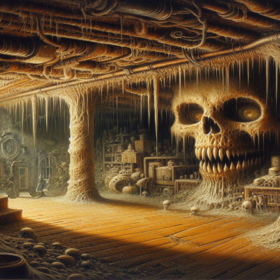See Page XX
See Page XX – February 2019

Love is in the air this month, and if you’re looking to spend alone time with a loved one, we have a delectable choice of date night activities for you, with the release of the second GUMSHOE One-2-One game Night’s Black Agents: Solo Ops, and the massive Cthulhu Confidential nine-adventure collection, Even Death Can Die. Or if you’d prefer to be let alone, Garbo-style, hide behind the 4-panel Director’s Screen and Resource Guide for Night’s Black Agents.
New Releases
-
-
- Night’s Black Agents: Solo Ops – Pre-order the new GUMSHOE One-2-One game with a Night’s Black Agents flavour, and get the pre-layout PDF now
- Even Death Can Die – Pre-order this adventure collection for Cthulhu Confidential and get the pre-edit draft PDF now
- Night’s Black Agents Director’s Screen and Resource Guide – Pre-order the full-colour, 4-panel Director’s Screen for Night’s Black Agents, and get the PDF now
- The Book of Ages PDF – A 13th Age collection of now-gone icons, fantastic treasures, brooding monsters, perilous dungeons, and ancient secrets from the previous twelve Ages
- Loot Harder PDF – Hundreds of new magic items for your 13th Age game
- Hideous Creatures: A Bestiary of the Cthulhu Mythos – Pre-order this monstrous compendium of Lovecraft’s most celebrated and cryptic creatures for Trail of Cthulhu, and get the PDF now
-
Articles
-
-
- View from the Pelgrane’s Nest – Cat Tobin with what’s new in the Nest
- See P. XX: Converting QuickShock Foes to Baseline GUMSHOE – Robin D. Laws on translating Foe stats from The Yellow King RPG‘s QuickShock to standard GUMSHOE
- Why GUMSHOE for Swords & Sorcery? – Kevin Kulp on why GUMSHOE makes sense for Swords of the Serpentine
- The Phone – Robin D. Laws with an adventure for The Yellow King RPG’s This is Normal Now setting
- Plain People of Gaming: Random Encounters of the Quade Kind – Gareth Ryder-Hanrahan’s hack for choosing random mutant powers for random mutant passers-by in Mutant City Blues
- What Kind of Hero Are You? Kevin Kulp on how Sentinel, Sorcerer, Thief, and Warrior, the four loose classes, define your character in Swords of the Serpentine
- Getaway! – Adam Gauntlett on making your Night’s Black Agents chase scenes more thrilling
- GMs wanted for Gen Con and Origins – It’s that time of year again! Here are all the instructions on how to join our GM team for 2019.
-
13th Age
-
-
- 13th Sage: Escalate the Drama! – Rob Heinsoo on some dramatic uses for the escalation die in 13th Age
- You can listen to the latest episodes of the Iconic podcast here:
-


